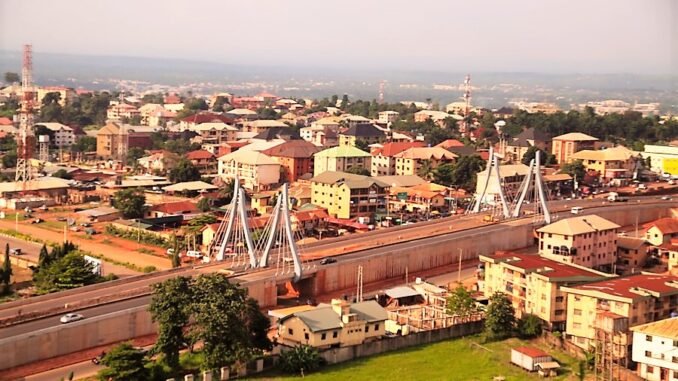
Awka, located in the heart of southeastern Nigeria, boasts a rich history that stretches back centuries. Renowned as the capital of Anambra State and the cradle of Igbo civilization, Awka’s story is intricately woven with the development of metalworking in West Africa.
Contents
Awka: An Ancient Igbo Town
Awka is a very old town in the Anambra region of Nigeria, where the Igbo people live. The story of how Awka began is like many other towns. A long time ago, people would move around a lot looking for a good place to live and grow their food.
According to Awka legends, a man named Nneoshi found a nice spot now called Ugwuoba. He settled there and raised a family with two sons: Ugwuoba and Awka. Back then, the eldest son inherited his father’s house after he died. This tradition is still followed in some Awka areas today.
So, when Nneoshi passed away, Ugwuoba took over the house. Awka, the younger brother, decided to start his own place. He moved south and settled in the area we now call Awka town. Awka’s family grew into two big groups called Ezi and Ifite.
As Awka’s family grew into villages, some interesting things happened. A skilled metalworker named Nnebuzo from another area came to Awka and decided to stay. He married there, had a big family, and started a village called Ezinato.
Another group, the Umudioka people, were known for their artistic skills and medicine. They traveled around helping people and settled in Awka too. One of them started the Umudioka village, which is now the biggest in Awka.
Over time, Awka kept growing with more families and villages. Today, it’s a town with four main areas and 33 smaller villages. Everyone shares the same history and traditions.
See>>> Land For Sale In Awka: Aku City
Titles: A Path to Respect in Awka
Titles are a huge deal in Awka, especially for men. It’s a way of earning respect and having a say in important matters.
There are different stages a man goes through to earn titles:
- Early Stages: It all starts with understanding a baby’s connection to ancestors (Igba Agu). Then comes the “Chi” ceremony, which qualifies a man to be a leader in his family or village, potentially leading to becoming the head of the household (Obi).
- Building a Reputation: After “Chi,” there’s the “Amanwulu” ceremony. These early titles prepare men for more prestigious ones like “Ajilija” and “Ozo.”
Ajilija: The Stepping Stone
This is a respected title many Awka men aim for. It allows a man to speak up on important issues. It’s expensive (thousands of Naira), but shows a man is responsible, has some wealth, and deserves respect. A wealthy man can even initiate several sons into this title. Those who complete it can wear a special cap and carry a stool.
Ozo: The Peak of Honour
This is the ultimate title, the most expensive and respected. It’s not common because it’s a long and costly process (28 days of community feasts!). The initiate becomes a community leader and member of the ruling class. They gain the right to wear an eagle feather on their cap, wear white threads around their ankles, and are seen as an authority figure.
See>>>Awka Postal Code- All Areas
The Rise of the Awka Blacksmiths
Over time, Awka emerged as a prominent center for metalworking, particularly ironworking. Legends speak of a figure named Agulu, who is credited with establishing the Awka blacksmithing guild and passing on his knowledge to his eight children. These sons, in turn, are said to have become the forefathers of the seven villages that make up the Agulu quarter of Awka today.
Awka’s blacksmiths gained renown throughout the region for their exceptional skills in crafting farming implements, weapons, and tools. Their expertise was highly sought after, and their products were traded far and wide. The intricate details and high quality of their work continue to be admired even today.
Recommended>>> Fun Places In Awka For Family, Couples And More
Beyond Metal: Trade, Religion, and Social Structure
While metalworking remained central to Awka’s identity, the town also flourished as an agricultural and trade center. Yams, cassava, maize, palm oil, and kernels were all important commodities traded with neighboring communities. Awka’s strategic location within the Igbo heartland further facilitated its commercial importance.
Religion also played a significant role in Awka’s social fabric. The town housed the Agballa oracle, which, while subordinate to the supreme Igbo oracle at Arochukwu, held considerable influence in the region, particularly during the pre-colonial era. Awka’s political structure was traditionally decentralized, with titled men known as Ozo and Ndichie, respected for their achievements and contributions to the community, holding positions of authority.
The Colonial Era and Modern Awka
The arrival of European colonists in the late 19th and early 20th centuries brought significant changes to Awka. The town’s role in the hinterland slave trade, facilitated by the Agballa oracle, came to an end with British rule. However, Awka’s importance as a center for metalworking and commerce continued.
In 1991, Awka’s long history as an administrative center culminated in its designation as the capital of Anambra State. Today, Awka is a bustling city with a population exceeding 430,000. While its traditional crafts continue to be cherished, the city has also embraced modern development, becoming a hub for education, technology, and industry.
A Legacy that Endures
Awka’s story is a testament to the enduring spirit of the Igbo people and their rich cultural heritage. From its early days as a center of ironworking innovation to its modern transformation as a capital city, Awka’s legacy continues to inspire and shape the region.
Sources:
- Follow me on TikTok for quick tips and behind-the-scenes tours
- Subscribe to my YouTube channel for in-depth videos and property showcases
- Follow me on Facebook for updates, listings, and real estate advice


Leave a Reply